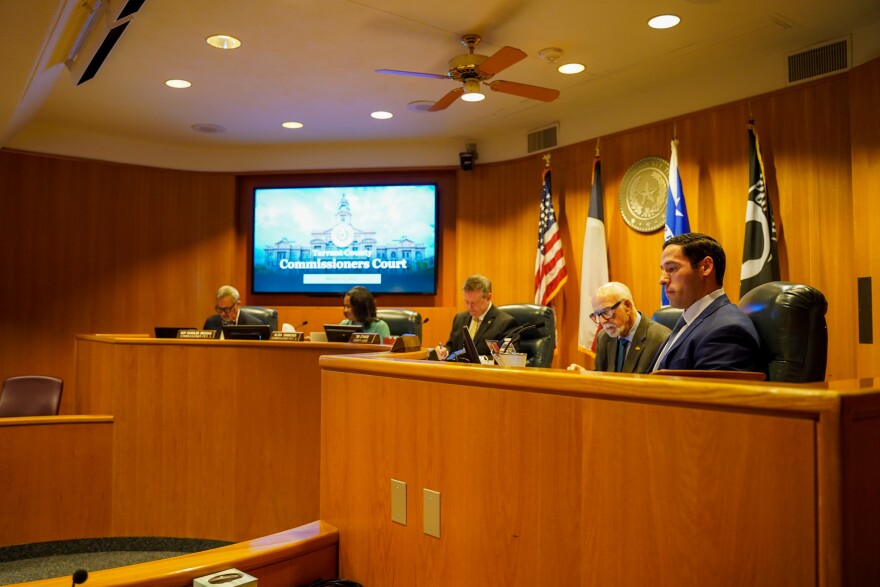Tarrant County commissioners discussed the death of Robert Miller behind closed doors this week. Before that, community members demanded they move forward with a promised review of Miller's autopsy.
Miller died in Tarrant County Jail custody in 2019. His official cause of death is listed as a sickle cell crisis, but a Fort Worth Star-Telegram investigation suggested Miller didn’t have sickle cell disease, and he may have died from being pepper-sprayed repeatedly in jail.
In December, the county hired a forensic pathologist in Illinois, Dr. J. Scott Denton, to review Miller’s autopsy, but Denton told KERA in April that the county never sent him materials to review before his contract expired.
Community members stood before commissioners at the public portion of their Tuesday meeting to demand that the county review Miller’s autopsy as promised.
Becky Delaune pointed to the lawsuits pending against the jail and the dozens of in-custody deaths in recent years.
“These have been shrouded by secrecy and silence by our sheriff's office and most recently this court. When is this going to stop?” she said.
In a press release on April 24, the county explained that it sent blood samples to the Mayo Clinic. The Mayo Clinic confirmed that Miller carried the sickle cell gene, making Denton’s review unnecessary, the press release states.
But carrying the gene is different than having sickle cell disease.
Sharon Hines of Fort Worth told commissioners Tuesday that she also has sickle cell trait.
"People do not die from sickle cell crisis because you carry the gene,” she said.
Someone needs to have full-blown sickle cell disease to die of a sickle cell crisis, according to experts interviewed by the Fort Worth Star-Telegram.
The American Society of Hematology states that cases where authorities blame a sudden death on sickle cell trait “must be viewed with profound skepticism.”
KERA sent a county spokesperson a list of questions, including when the Mayo Clinic review happened and who decided to nix Denton’s review. The spokesperson said the county can’t answer questions about the case. The April 24 press release says due to pending litigation – a lawsuit from Miller’s widow, Shanelle Jenkins, against the Tarrant County Sheriff’s Office – the county will have no further comment.
Dallas civil rights attorney David Henderson represents Jenkins in her lawsuit. The county's press release last week led to a realization, he said.
“They feel completely comfortable grossly misrepresenting what happened to someone who was killed in their custody,” Henderson said. “They feel so emboldened to be untruthful about what happened, it raises the concern about how often people have been killed and thrown away in the Tarrant County Jail the way Mr. Miller was.”
Emails between Denton and the Tarrant County medical examiner, obtained through a public records request, show that the county planned to send Denton materials to review up until the very last day of his contract, Feb. 28.
On Feb. 27, Henderson's colleague, attorney Sebastian Van Coevorden, emailed Denton asking if the review was ever completed.
Denton forwarded the lawyer’s email to Tarrant County Medical Examiner Kendall Crowns.
“Hi Kendall. FYI, I did not expect this email from an attorney. Also I did not receive any materials to review. Please let me know if you or I should respond to his email,” he wrote.
Crowns responded on Feb. 28.
“We have the materials to send to you. Should be out today. What address is it that we need to send them too [sic]. Also I will make sure contract gets extended. Don’t reply to this attorney. Not sure what is going on there,” he wrote.
Denton responded that the email from a civil rights attorney “changes the whole scope and tone of the review.”
Crowns told Denton he had overnight the materials. That never happened.
Van Coevorden told KERA that Denton’s review was “a glimmer of hope” for Jenkins, who has struggled to get any information about her husband’s death.
"Having to explain to her why nothing happened, for no apparent reason beyond the cover-up, it's been very difficult for her,” Van Coevorden said.
The Texas Legislature is considering a bill that would get rid of the requirement to have an outside law enforcement agency investigate all jail deaths. Deaths deemed to be from natural causes would be exempt.
The state Senate passed the bill Tuesday. To become law, it still needs to go through the House and get the governor's signature.
Miller's death was originally deemed natural. The Tarrant County Medical Examiner's website now lists his manner of death as "undetermined."
Got a tip? Email Miranda Suarez at msuarez@kera.org. You can follow Miranda on Twitter @MirandaRSuarez.
KERA News is made possible through the generosity of our members. If you find this reporting valuable, consider making a tax-deductible gift today. Thank you.





